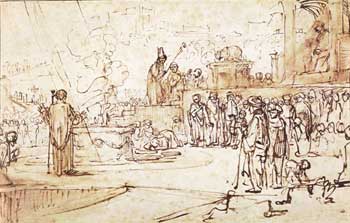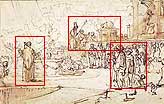
Ahab versus Elijah
As king of Israel for 22 years (874-852 BCE), Ahab successfully forged a triangular alliance between Israel, Judah and Tyre, which yielded great political and economic advantages for his kingdom. The political arrangement with Phoenicia was secured through Ahab's marriage to Jezebel princess of Sidon. With that marriage, the cult of Baal penetrated into Israel and threatened the foundations of Israelite culture. Ahab built a sanctuary to Baal in his capital city of Samaria, imported the worship of the goddess Ashera and encouraged Baal worship throughout Israel.
In addition to his political, economic and cultural accomplishments, Ahab was involved in what was indubitably one of the most important battles in the ancient world -- the battle of Qarqar that took place in 853 BCE. A monolith of Shalmanesser III supplies our information concerning this battle.
Shalmanesser III, King of Assyria left his palace in Ninveh and set out to conquer the Fertile Crescent. He was met in Northern Syria at the city of Qarqar by an alliance of twelve kings. The inscription lists each king by name along with their contribution to the war effort; chariots, camels and foot soldiers. What is remarkable about the list is that Ahab king of Israel appears with rival kings of the region such as Hadad-ezer of Damascus and Irhuleni of Hamath. Commonality of purpose allowed them to overcome their differences and fight together against the Assyrian king.
It is of particular significance that Ahab contributed two thousand chariots to the war effort; more than all of the other kings combined. While Shalanesser III claimed a decisive victory, history indicates that the alliance that was successful in halting the Assyrian advance.
Ahab achieved great acclaim through this victory. His military and political success inspired the people to loyally support all of his policies including his cultural and religious ones.
What was Elijah's attitude toward Ahab? There are several points in the narrative where this becomes evident. After having absented himself for three long years of drought, Elijah reappears. The long awaited reunion between the desperate king and the vigilante prophet is described as follows:
When Ahab caught sight of Elijah Ahab said to him. Is that you troubler of Israel? He retorted it is not I who have brought trouble on Israel but you and your father's house by forsaking the commandments of the Lord and going after the Baalim.(I Kings 18:17)
This exchange seems to constitute a rather petty level of name calling for a king and a prophet. Had Ahab been waiting three years to call Elijah a troublemaker? Was it worthy of the prophet of God to repay the royal insult with an insult?
The answer, of course, is that the debate was much deeper. The two protagonists were not on the same wavelength. Ahab saw himself as a victorious savior of Israel who had accomplished great things for his people through his international exploits. He saw Elijah as a thorn in the side of national progress. Elijah points the accusing finger at Ahab as the real "troubler of Israel". He and his household abandoned their ancestral faith and shirked their religious responsibility. Elijah's contention is that for a leader of Israel, the only measurement of success is his unwavering devotion to God. All else is of no consequence.
Now summon all Israel to join me at Mount Carmel, together with the four hundred and fifty prophets of Baal and the four hundred prophets of Asherah, who eat at Jezebel's table. Ahab sent orders to all the Israelites and gathered the prophets at Mount Carmel. Elijah approached all the people and said, "How long will you keep hopping between two opinions? If the Lord is God, follow Him; and if Baal, follow him!" But the people answered him not a word. (IK18: 19-21)
It is instructive that Ahab enthusiastically agreed to the contest on Mount Carmel. Although one might argue that his agenda was to defeat Elijah and assert the unequivocal power and preeminence of the prophets of Baal, it is more likely that Ahab suffered from the same syndrome as the people -- he too wavered between ideologies. The contest would establish once and for all who was the true god: Baal or the God of Elijah.
Restoring the Ruined Altar >>